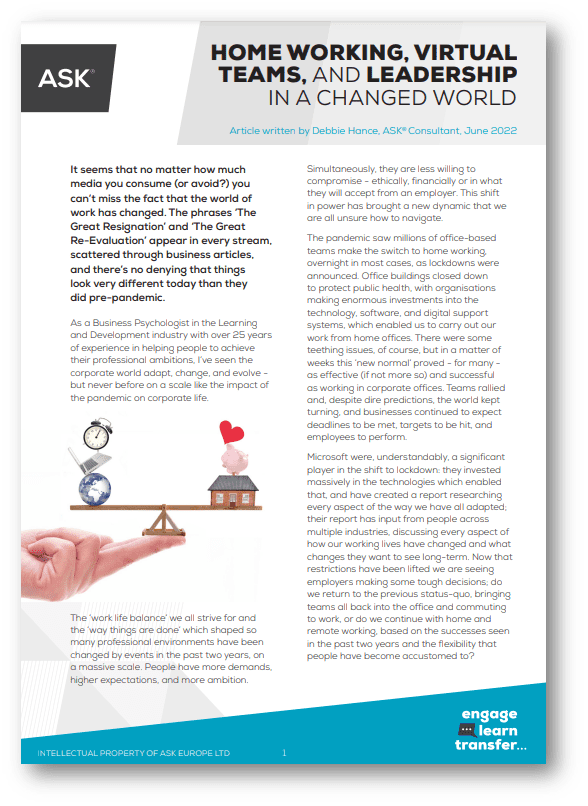What do you want to achieve?
Do you practice what you preach with your approach to leadership?
Companies around the world lay out their mission statement and a code of conduct, tying together their business goals and expectations for their employees – and all too often the same phrases and buzzwords are peppered throughout them all, but those behaviours aren’t modelled by the very people who hope to enforce them in others.
Where are business leaders letting their teams down, and how can you help yours to practise what they preach?
What do you want to achieve?
The first step in modelling effective leadership, and in engaging your employees, is to clarify what precisely you want to achieve, as a business and within each department or team representing that business.
This means honesty, communication, effective measures of achievements, and an agreement about what goals and targets are in place, and who is responsible for every aspect of meeting those targets.
An effective leader not only fully understands what the organisation aims to achieve, but can effectively guide and support the whole workforce towards that achievement, with an understanding of the skills and abilities of every member of the team, and how best to position them as individuals to inspire the most successful result from the whole. Leaders who communicate their needs and aims well bring the team together, and create an environment of success, autonomy and positivity which impacts on performance levels, retains the workforce, and allows for greater satisfaction – and a higher likelihood for achieving goals and succeeding targets.
An ineffective leader, on the other hand, will never really understand what different departments do or how that impacts on others, and will pit people against each other, creating conflict and confusion, which not only impacts on the success of the organisation, but leads to an air of dissatisfaction and unrest. This can lead to a higher turnover of staff, to a lack of appropriate skills, and to inefficient processes and ineffective results.
Who are you really working FOR?
For this to work, a leader needs to embody the traits and behaviours that really matter. Rather than simply pushing people to their limit to meet a target or tick the right number of boxes off a list, a leader needs to fully understand their team, the targets and goals being worked towards, and how to get the best from everyone working with them, as individuals and as a piece of the team that creates each department within the organisation.
An ineffective leader will be focussed so much on their own importance, on gaining more power over others, and on being praised for their own greatness that the people who work for them are overlooked or, worse, mistreated in the process.
Leadership isn’t about working for the organisation as much as it is working for the people within that organisation.
You are there as a spokesperson, a figurehead and a guide. Successful leadership brings together the needs of the business, and of the workforce.
An ineffective leader wields their power as a weapon, using it to belittle and intimidate those who work for them – and place the blame for any failings anywhere but at their own door. Leaders who claim the credit for success and use their position to bolster their ego are damaging not only to the team they head, but to the organisation as a whole, creating a gulf between the workforce and management, and leading to mistrust, resentment and unhappiness.
What incentive do your employees have?
If your employees feel that their leaders and managers don’t embody the behaviours and goals laid out in your organisation’s code of conduct, mission statement or future plans, what incentive do they have to do so?
When a leader displays the kind of mismanagement and damaging traits which create negativity and dishonesty, the people who work in their department will either want to leave, will perform poorly, or will model the same kinds of behaviours demonstrated from their management.
This current of ineffective working will spread throughout the organisation, allowing a rot to set in which can seriously damage the performance, reputation and success of any business.
If, however, you have a leader in place who models the honesty, integrity and work ethic you desire from your entire workforce, they will guide, support and inspire the same in their team – and this positivity will spread in a way which creates a much more successful environment.
You can sense the kind of environment within an office within moments – and the importance of effective leadership can be felt in every corner. If you want to support your leaders and develop their skills and confidence to see this kind of success throughout your own organisation, call us today on 01234 757575 to discuss our leadership development programmes, and let’s work together to get the best from all of your people.



